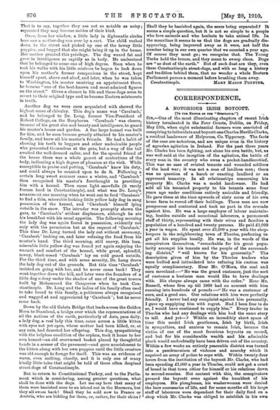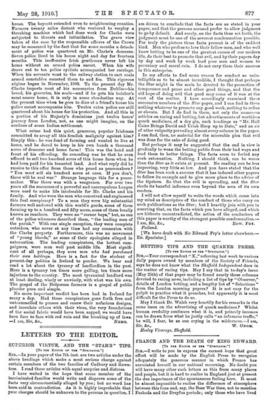CORRESPONDENCE.
A NOTORIOUS IRISH BOYCOTT. [Tb nut Elmo* OP P55 "Etrzerwros."1
SIR,—One of the most illuminating chapters of recent Irish history terminated in the Four Courts, Dublin, on Friday, May 13th, when eight substantial farmers were convicted of conspiring to intimidate and boycott one Charles Neville Clarke, a resident landowner of Holycross, Co. Tipperary. The facts of the case are notorious, and are unique even in the history of agrarian agitation in Ireland. For the past three years Mr. Clarke has been fighting, not alone his own battle, but, as was well said at the inception of the agitation, the battle of every man in the country who owns a pocket-handkerchief. This was no case of evicted tenants and wounded soldiers of the land war ; it was not a case of landless men; there was no question of a harsh or exacting landlord or an oppressed tenantry. In all relationships concerning his property Mr. Clarke was a model landowner. He bad sold all his tenanted property to his tenants some four years ago under conditions entirely amicable and friendly. He gave them at the time upwards of sixty acres of his own home farm to round off their holdings. These men are now prosperous and contented and took no part in the crusade against him. He was a large employer of labour maintain- ing, besides outside and occasional labourers, a permanent staff of thirty, representing with their wives and families a population of a hundred and twenty persons. He paid £1,000 a year in wages. He spent over £1,000 a year with the shop- keepers in the neighbouring town of Thurles, preferring to get all his supplies locally. He was, in the words of the conspirators themselves, "remarkable for his great popu- larity amongst his tenants and the people of the surround- ing district," " well known for his generosity." The description given of him by the Thurles traders who were bullied and intimidated into refusing his custom was equally complimentary. Hear Mr. O'Mara, the coal and corn merchant :—" He was the grand customer, just the sort of customer a business man would like to have dealings with. His cheque always came with the order." Hear Mr. Russell, whose firm up till 1908 had an account with him running into hundreds of pounds :—" He was a customer of ours, and a good one. Our relations with him were perfectly friendly. I never had any complaint against him personally. I gave up supplying him with regret. Had I been free to do so, I would have continued to supply him." Every trader in Thurles who had any dealings with him had the same story to tell. And yet—? Within an incredibly short space of time this model Irish gentleman, Irish by birth, Irish in sympathies, and anxious to remain Irish, became the victim of one of the most ferocious boycotts on record, and but for his considerable wealth and his admirable pluck would undoubtedly have been driven out of the country. Within a few weeks an entirely peaceable district was turned into a pandemonium of violence and anarchy which it required an army of police to cope with. Within twenty-four hours from the institution of the boycott Mr. Clarke, who had been spending £1,000 a year in Thurles, could not get a crust of bread in that town either for himself or his relations down to second-cousins. Not content with this, the conspirators pressed the boycott even against the humblest of his employees. His ploughman, his washerwoman were denied the bare necessaries of life, and for some months all his large staff of labourers were dependent for their daily food on a shop which Mr. Clarke was obliged to establish in his own house. The boycott extended even to neighbouring counties. Farmers twenty miles distant who ventured to employ a. threshing machine which bad done work for Clarke were subjected to threats and intimidation. The grave view taken of the case by the responsible officers of the Crown may be measured by the fact that for some months a detach- ment of police was quartered on Mr. Clarke's demesne. Seven police lived in his house night and day for fourteen months. This inoffensive Irish gentleman never left his home without an armed police escort. When his wife drove out to tea police cyclists accompanied her carriage. When his servants went to the railway station to cart coals armed constables escorted them to and fro. This rigorous regime began in November, 1908. To the present day Mr. Clarke imports most of his necessaries from Dublin—his bread, his groceries, his coals—and if he gets his butcher's meat nearer home, it is only in some clandestine way. At the present time when he goes to dine at a friend's house his police escort accompanies him. Twelve extra police are still quartered about his house for his protection. And all this in a portion of his Majesty's dominions just twelve hours' journey from London, not, as one might imagine, on the confines of some Indian settlement.
What crime had this quiet, generous, popular Irishman committed to array all this fiendish malignity against him? Simply this : he was fond of farming and wanted to live at home, and he dared to keep in his own hands a thousand acres of demesne and home farm! This was the head and front of his offending. So conceding was he that he even offered to sell two hundred acres of this home farm when he had been paid for his tenanted land. And what reply did he receive to this offer from those who posed as peacemakers P " You must sell six hundred acres at once. If you don't, there will be real war." Strange language this for a peace- maker. War there was with a vengeance. For over two years all the resources of a powerful and unscrupulous League were used to make life intolerable for Mr. Clarke and his family. And who were the men who conceived and engineered this foal conspiracy? To a man they were big substantial farmers well endowed with this world's goods, some of them farming up to a hundred and fifty acres, some of them locally known as ranchers. They were no " corner boys," but, as one of the police witnesses described them, " the leading men of the parish." With one single exception, they were complete outsiders, who never at any time had any connexion with the Clarke property. Furthermore, this was no movement of "young bloods," as some of their apologists alleged in extenuation. The leading conspirators, the hottest cam- paigners, were men well past middle life. Most signifi- cant of all perhaps, they were men who had purchased their own holdings. Here is a fact for the student of present-day politics in Ireland to ponder. We hear and read a lot about the tyranny of landlordism in the past. Here is a tyranny ten times more galling, ten times more injurious to the country. The most tyrannical landlord was at least dealing, wisely or unwisely, with what was his own. The gospel of the Holyoross farmers is a gospel of public plunder pure and simple.
No more important verdict has been had in Ireland for many a day. Had these conspirators gone forth free and untrammelled to pursue and renew their nefarious designs, and inoculate others with their virus, the very foundations of the social fabric would have been sapped, we would have been face to face with red ruin and the breaking up of laws.















































 Previous page
Previous page